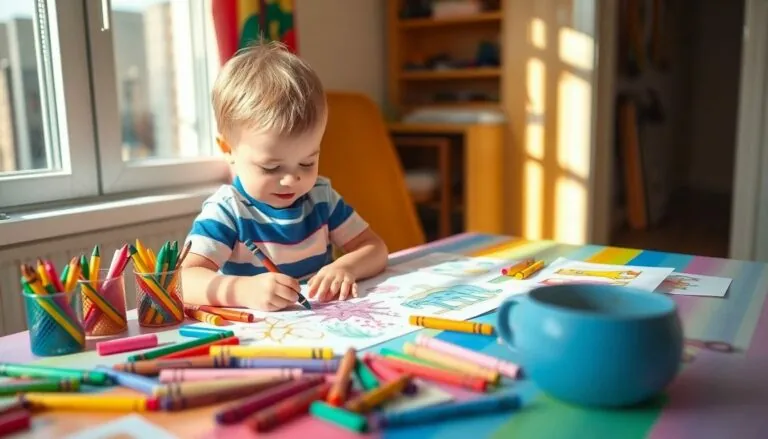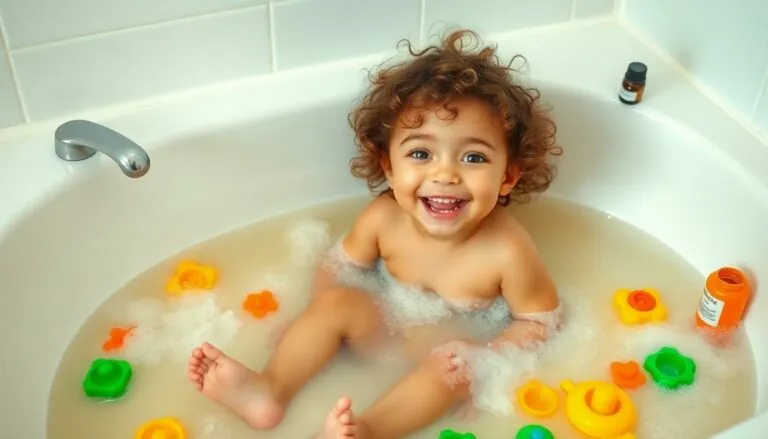Table of Contents
ToggleT-ball for toddlers is more than just a game; it’s a rite of passage that transforms tiny tots into future sports stars—at least in their parents’ eyes! Picture this: a field full of pint-sized athletes, oversized helmets wobbling on their heads, and bats swinging like they’re trying to fend off a swarm of bees. It’s a delightful chaos that brings laughter and joy to families while teaching little ones the basics of teamwork and coordination.
Overview of Tball for Toddlers
T-ball serves as an engaging introduction to the world of baseball for toddlers. Children typically ages 4 to 6 participate in this simplified version of the sport. The primary objective centers on developing basic skills like hitting, catching, and throwing.
Kids use larger bats and softer balls to enhance safety while boosting confidence. Games feature a smaller field layout, making it easier for young players to navigate the playing area. Coaches focus on encouraging participation, fostering excitement, and instilling a love for the game.
Parents often observe an energetic atmosphere filled with laughter and cheer. Young players learn vital social skills through team interactions, emphasizing teamwork and collaboration. Involvement in T-ball can also enhance physical benefits, improving hand-eye coordination and promoting overall fitness.
Most leagues emphasize fun over competitiveness, allowing kids to explore sportsmanship at an early age. As each toddler sports oversized gear, they engage in processes that develop their motor skills and coordination gradually. Players learn how to follow directions while playing together, setting a foundation for future team sports.
T-ball encourages a supportive environment where children experience success, whether they’re hitting the ball off the tee or participating in a playful game with peers. Overall, T-ball introduces toddlers to the joys of sports, laying the groundwork for ongoing athletic development.
Benefits of Tball for Toddlers
T-ball for toddlers offers numerous advantages that support their overall development. Engaging in this sport enhances physical and social skills, laying a strong foundation for future athletic experiences.
Physical Development
Physical growth significantly benefits from T-ball participation. Children improve hand-eye coordination through activities like hitting and catching. Increased agility occurs as they navigate the smaller field. Essential motor skills develop while running and throwing. Enhanced fitness levels result from the active gameplay, promoting a healthier lifestyle. T-ball also instills confidence in toddlers as they accomplish new physical tasks. Learning to control their movements encourages overall body awareness.
Social Skills Development
Social interactions flourish during T-ball games. Engaging with teammates encourages cooperation and teamwork. Sharing space and equipment teaches important lessons about collaboration. Communication skills improve as players call for the ball and cheer each other on. Developing friendships occurs naturally in this supportive environment, fostering a sense of belonging. Toddlers also begin understanding sportsmanship through fair play, learning to respect opponents and appreciate victory and defeat. The foundation of these social skills carries into other areas of childhood development.
Key Features of Tball Programs
T-ball programs for toddlers feature engaging elements tailored specifically to young players. These essential characteristics create a positive introduction to sports.
Age Appropriateness
Programs target children aged 4 to 6, allowing for age-appropriate activities. Skill development focuses on fundamental movements, like hitting and catching. Encouragement comes from coaches who prioritize fun, making participation enjoyable. Activities cater to various skill levels, ensuring that each child can engage without feeling overwhelmed. This age-specific approach fosters a supportive environment where toddlers can explore sports for the first time.
Equipment Used
Equipment is designed to meet the needs of young players. T-ball bats are larger and lighter to help children swing confidently. Soft balls reduce the risk of injury while allowing for successful hitting experiences. Bases are closer together, making the field manageable for toddlers learning to run and navigate. Participating in T-ball with properly sized equipment cultivates excitement while fortifying skills like coordination and confidence in each player.
How to Choose the Right Tball Program
Selecting a suitable T-ball program for toddlers involves considering several important factors. Families should assess the program’s focus on fun and developmental benefits. It’s essential that the environment supports participation without pressure, keeping young players engaged and motivated.
Factors to Consider
Age-appropriate activities form the backbone of a quality program. Look for leagues specifically designed for children aged 4 to 6 that emphasize skill development through enjoyable practices. Equipment choice matters too; programs should utilize larger, lighter bats and softer balls to enhance safety. Proximity of bases can improve the game experience, making it easier for toddlers to navigate the field. A supportive coaching staff encourages teamwork and excitement, ensuring a positive atmosphere for all players.
Questions to Ask Coaches
Inquiring about a coach’s approach provides insight into the program’s quality. Ask about their experience working with young children and how they prioritize fun. Explore how they promote skill development while fostering teamwork among players. Coaches should explain their strategies for ensuring every child participates and feels included. Understanding field layouts and equipment specifications can clarify how the program aligns with developmental needs. By gathering this information, families can make an informed decision about the right T-ball program for their toddlers.
Tips for Parents to Support Their Children
Encouraging a positive experience in T-ball involves actively engaging with your child. Attend practices and games to show support and celebrate their efforts. Providing a relaxed atmosphere fosters confidence, allowing toddlers to explore their skills without feeling pressure.
Choosing the right equipment plays a crucial role in safety and enjoyment. Make sure that bats and balls are appropriate for their size and age group. Many programs use larger, lighter bats and softer balls, designed specifically for toddlers.
Incorporating fun into practice is essential. Create opportunities for play at home, such as practicing hitting off a tee or playing catch in the yard. Encouragement and praise during these activities boost a child’s self-esteem, helping them feel proud of their progress.
Talking about teamwork further enhances the T-ball experience. Emphasize the importance of cooperation and communication with teammates. Discussing game rules and strategies at home can spark their interest and understanding of the game.
Fostering friendships among teammates supports social development. Arranging playdates with teammates encourages connections outside the field. Encouraging positive interactions helps children practice important social skills that extend beyond T-ball.
Explaining the importance of sportsmanship contributes to their character development. Encourage your child to cheer for teammates and show respect to opponents. Reinforcing these values helps establish a strong foundation for future athletic pursuits.
Lastly, maintaining open communication with coaches provides valuable insight. Asking about your child’s progress and behavior during practices can help parents identify areas for growth. This information allows families to better support their child’s development in T-ball and beyond.
Conclusion
T-ball for toddlers is more than just a game; it’s a gateway to essential life skills. Through playful interactions on the field, children not only learn the fundamentals of baseball but also develop teamwork and social skills that will benefit them for years to come.
The supportive atmosphere of T-ball encourages young players to explore their abilities while having fun. With age-appropriate equipment and a focus on enjoyment rather than competition, toddlers can thrive in this nurturing environment.
As families engage in this experience together, they create lasting memories and foster a love for sports that can lead to a lifetime of physical activity and camaraderie. T-ball truly sets the stage for a bright athletic future.







